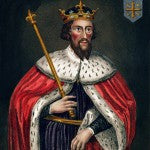 St. King Alfred the Great
St. King Alfred the Great
Image source: Huffington Post
After the fall of the Roman Empire, most of western Europe found itself vulnerable to threats Rome would have previously protected it from. It was a precarious time, with various groups deciding to seize the opportunity to exploit Rome's lack of presence, not least of which were the mighty Vikings.
Perhaps it was because of Britain's proximity, perhaps it was because of its wealth of treasures, perhaps it was because of its largely peaceful monasteries, or perhaps it was a combination of other factors, but the Vikings were especially prone to raiding the British Isles, causing problems for the Anglo-Saxons who inhabited Britain during that time. The Vikings and the Saxons seemed to have this perpetual hostility between them.
During those times, a figure rose to prominence.
On the Anglo-Saxon side was Alfred the Great, King of Wessex. Born on 849 AD, Alfred was born in what is now Wantage in Oxfordshire, the youngest of King Æthelwulf’s sons. He was supposedly accepted as Pope Leo IV’s godson during a journey to Rome in 853.
When Aethelwulf died, Alfred’s brothers, Æthelbald, Æthelberht, and Æthelred ruled Wessex in succession.
In 868, Alfred fought beside Æthelred, where they were defeated at the Battle of Basing on January 22 and the Battle of Merton in March. Æthelred perished in April, leaving Alfred as the sole successor. Wessex under the reign of King Alfred was the only sole surviving kingdom, as all the others had been raided by the Vikings. This urged him to lead a successful campaign against the invaders.
In 878, the Danish Vikings decided once again to attack Wessex. Alfred became rather crafty by adopting the strategy used by the Danes through the building of a fortified base in the Somerset marshes. In May, his troops defeating that Danes at the Battle of Edington.
Even with the victory, Alfred thought that it was impossible to drive the Danish Vikings out of England and the threat remained. He reorganized the armies of Wessex on the basis of duty rotation to raise an immediate reaction force who could fight while allowing peasants and commoners to go about their business. Across England, he started settlements which incorporated excellent defenses.
Due to the deterioration of education caused by the Danish raids, Alfred was prompted to establish a “court school” to educate those of noble birth and some of the lesser ones. He also advocated the use of the English language in education in reaction to the decay of Latin in his realm.
He died on October 26, 899. Although he wasn’t formally canonized, Catholics see him as a saint, with the date of his death as his feast day.
In 2002, BBC included him in the list of 100 Greatest Britons. Without Alfred, England during that time could have crumbled into instability and the world as we know it would be completely different.
Across the North Sea, another figure came to being. Although Christianity was deemed incompatible with Viking beliefs, a king in Norway managed to promulgate the Christian cause throughout the Viking community. This man was St. Olaf and we will cover him after the next post.
References:
Alfred the Great: The Most Perfect Man in History? History Today


